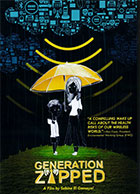
Generation Zapped 2017
Distributed by Collective Eye Films, 2305 SE Yamhill Street, Suite 101, Portland OR 97214; 503-232-5345
Produced by Sabine El Gemayel
Directed by Sabine El Gemayel
DVD , color, 74 min.
General Adult
Health, Technology, Radiation
Date Entered: 03/27/2018
Reviewed by Brandon West, Social Sciences Librarian, State University of New York at GeneseoDirector El Gemayel explores the impact that wireless technology is having on our health in this awareness-building documentary. The filmmaker takes the stance that that humans in developed countries are exposed to higher levels of radiation from radio frequencies and it is causing people to get illnesses, such as cancer. While the film raises some thought provoking questions, it loses some credibility through its lack of substantiated claims.
The documentary begins by interviewing a man with a professed electromagnetic sensitivity, an diagnosable condition where individuals feel ill around radio frequencies. The film quickly switches gears to a woman who was diagnosed with breast cancer after holding her cellular phone in her brassiere. Then, the film delves into a conspiracy about why the United States government does not want more research on the effect of radio frequency radiation. The film also addresses many other topics including the impact of wireless radiation on children’s attention spans and the blood brain barrier. While these topics are related to the overall theme of the documentary, the transition between topics is clunky and seemingly unrelated. Furthermore, these topics are only addressed at a surface level and do not give well rounded perspectives, which is important to make sure viewers understand the science behind the issues.
Generation Zapped features interviews with experts from around the world to explore the societal and health issues with radio frequency radiation. For the most part, these folks admit they do not have any current scientific evidence that directly connects exposure to radio frequencies to certain diseases. Their credibility is questionable at times, such as when one expert explains that people absorb “…a quintillion times more radiation than ten years ago” without explaining how he knows this fact. Occasional quips and anecdotes from questionable sources, including television host Dr. Oz and musician Sheryl Crow, are used as contributions to arguments, which diminishes the seriousness of the film.
It terms of technical quality, Director El Gemayel has shot a good-looking film that meets the standard quality of modern cinema. Despite its flaws with unfocused narrative and questionable research, the film raises important questions about radio frequency radiation that are worth discussing and warrant additional research. Even with the ability to raise awareness of this issue, the film is probably too speculative for most academic classrooms. Some viewers may end up being more misinformed about radio frequency radiation; the film presents strong arguments and opinions, but the veneer of a scientific approach is a bit misleading.
Awards
- Award of Excellence, IndieFEST Film Awards 2017